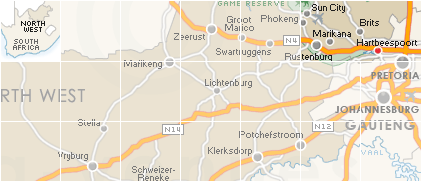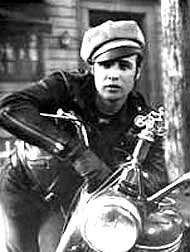Biking in South Africa - by Cathy Brown
South Africa is one of the most diverse and enchanting countries in the world. Exotic combinations of landscapes, people, history and culture offer the adventure rider a unique and inspiring experience. I am definitely a non-biker but I’m hoping to share what I know about South African biking with you.
I am from Johannesburg and ever since I can remember I have known about the Harties Breakfast run. This is a 59km or 36.7 mile ride to Hartebeestpoort Dam. The ride takes place on a Sunday. Harties is a great destination with lots of places to visit when you get there - like the Bushbabies Primate Sanctuary and Elephant Sanctuary, also the de Wildt Cheetah Reserve is en route. There are great places to eat and they are well used to seeing lots of bikers on weekends.
The N4 main road into Harties is well kept, with an occasional police presence.Generally, bikers and cops are friendly and respectful to one another - as long as papers are in order there is a good relationship.
Harties by night
An interesting event taking place this year is the Pro-Africa Adventure Tour, starting from Johannesburg. The plan is to ride through 10 countries just using back roads, with only old fashioned maps and instinct to rely on. The group will have to be self-sufficient and look out for each other as there will be no back up or support vehicles to step in to help. The group will ride through 10 countries including Angola, Botswana, Zambia, Tanzania, Mozambique, Zimbabwe, Malawi, Lesotho and Swaziland - one country per month. It sounds quite a trip!
There are other popular bike events, such as Mandela Day which is recognised as an international day of humanitarian action in celebration of Nelson Mandela’s life and legacy. People are called to devote 67 minutes of their time to serving their communities (this year it is 67 years Mandela has spent making the world a better place).
Mandela Day this year fell on 18 July and a sprinkling of celebrities joined a group of ordinary bikers leaving Monte Casino in Johannesburg on 11 July, making their way through Gauteng, the Free State, KwaZulu Natal, Mpumalanga and parts of Swaziland. The 200km ride would take the group into more rural terrain too. They would then devote 67 minutes of their time to activities at various community projects along the way, returning to Pretoria on the former president’s birthday on the 18th.
Mandela Day this year fell on 18 July and a sprinkling of celebrities joined a group of ordinary bikers leaving Monte Casino in Johannesburg on 11 July, making their way through Gauteng, the Free State, KwaZulu Natal, Mpumalanga and parts of Swaziland. The 200km ride would take the group into more rural terrain too. They would then devote 67 minutes of their time to activities at various community projects along the way, returning to Pretoria on the former president’s birthday on the 18th.
In South Africa, we have quite an active ‘Think Bike’ campaign which aims to target motorcycle and road safety. There is a good reason for this - road safety in South Africa is nothing less than shocking. For the most part there is no police presence and those that are about take bribes for everything. It does however, depend on the province – for example, in KwaZulu Natal, they are quite good there in trapping speedsters. You don’t drink and drive there and sentencing is very harsh. Others are much more lenient – if they catch you at all.
During the holidays, for example at Christmas, everyone heads to the coast and the amount of fatalities at this time is ridiculous - even though the roads are in good condition. A big problem is taxis/mini buses that are loaded too full – if they are supposed to have 11 people they will squeeze in 20. These vehicles are not roadworthy most of the time and a lot don’t even have licences. You can imagine the deaths that occur from this including killing bikers and other road users. A two-vehicle collision can easily have double figure fatalities.
According to the World Health Organization, 14,920 people are killed on South Africa’s roads per year. This is 5 times more than the UK, even though we have a smaller population of 50.5 million. In addition, there are 219,978 road injuries a year. Accidents in South Africa cost R50 billion a year (£4.3bn).
Bike jacking is present - bikers are vulnerable, as you can imagine. They are not targeted more than any other type of hijacking though (that’s not much comfort, I know!). However, bikers can sometimes be their own worst enemy because they know they can get way with riding without a licence plate so they do what they want on the roads and often come off second best. Nevertheless, bikers are not seen as rebels or undesirables here. People come from all walks of life with a passion for biking. There is no colour associated with biking either and there are many women bikers too. Often children accompany their parents on rides so it can be very much a family outing.
In South Africa the fastest growing segment is the Adventure type motorbikes like the BMW F1200GS, F800GS, Yamaha Tenere 660 and 1200, Triumph 800 and 800XC, KTM990 or similar. We also have a rather huge Harley Davidson following. Naked type bikes are few and far between. Sportbikes are still popular but the sales are declining.
From the different aspects of biking in South Africa that I have written about I hope you can see that while there are problems, there are also many advantages to biking in South Africa – including good roads, a vibrant culture, stunning scenery and a friendly welcome. I hope you have learned a bit about South African biking from this article and maybe one day you will visit South Africa on a biking holiday yourself!


















